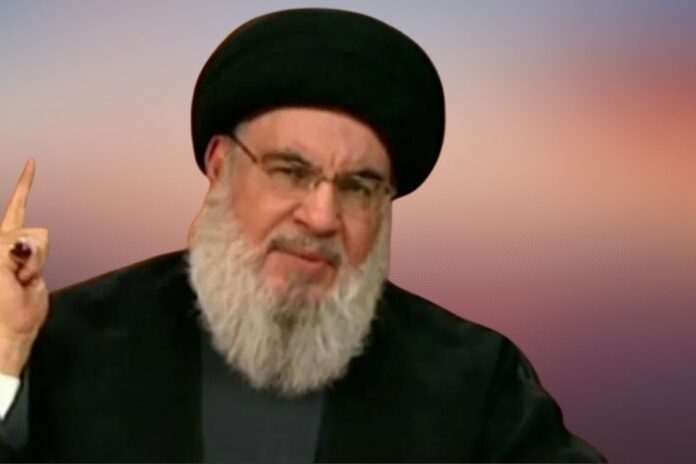The unexpected threat from Hezbollah towards Cyprus has raised alarms about the island’s geopolitically sensitive position, according to experts. The assertion by Hezbollah that it will respond to Cyprus if it aids an Israeli assault on Lebanon has led to a deeper scrutiny of the Mediterranean nation’s role in regional politics.
The citizens of Cyprus were startled when Hezbollah’s leader, Hassan Nasrallah, in a statement on June 19, declared that Cyprus would be treated “as part of the war” if it allowed Israel to utilize its airports and bases for military strikes on Lebanon.
“The government of Cyprus needs to exercise caution,” Nasrallah warned.
This pronouncement was met with astonishment by many.
In response to these threats, President Nikos Christodoulides affirmed to the press that “Cyprus does not participate in military conflicts,” addressing Nasrallah’s remarks directly.
Angelina Pliaka, a legal professional in Nicosia, expressed her confusion and stated, “We are not involved and do not support Israel.”
Cyprus’s Geographic and Political Predicament
The ongoing armed conflict between Israel and Gaza over the past eight months, exacerbated by Hezbollah’s engagement, has brought the possibility of an extensive war between Israel and Hezbollah ever closer, bringing potential repercussions across the region.
Although regional tensions have escalated following a Hamas-initiated attack on Israel on October 7, up until now, Hezbollah had not specifically threatened Cyprus, a nation with strong links to Israel but also a gateway for humanitarian aid into Gaza.
Nasrallah’s remarks placed a spotlight on Nicosia’s strategic significance as an ally of the United States and a member of the European Union, located within range of Hezbollah’s missiles. This position has led to increasing concerns among its people about their capacity to provide refuge to those fleeing nearby conflicts.
Harry Tzimitras, director at the PRIO Cyprus Centre, mentioned to Al Jazeera that Hezbollah’s threat serves as “a stark reminder to the people of Cyprus of their geopolitical location and the fragility of their situation.”
Lying merely 100 miles from Lebanon, Cyprus’s strategic location as the most easterly EU state has been pivotal. In recent times, it has aimed to serve as the EU’s conduit into the Middle East, nurturing relationships with Israel and Egypt while keeping diplomatic ties with Iran.

According to Tzimitras, “Since around 2010-11, Cyprus has developed a significant alliance with Israel, reinforced during the Netanyahu administrations across political, financial, energy, and military sectors, positioning Cyprus as a key EU ally.”
Despite its associations, Cyprus has endeavored to remain detached from the ongoing conflicts at the borders of Gaza and Israel-Lebanon. Christodoulides also reiterated the humanitarian aspects, stating, “Our nation remains completely uninvolved.”
The Concern for the European Union
James Ker-Lindsay from the London School of Economics highlighted the surprise in the Cypriot government at the threats, emphasizing the concerns this raises within the EU. Discussions are expected about Europe’s response and persuading Iran to mitigate the situation.
During his speech on June 19, Nasrallah recalled Israeli military drills conducted in Cyprus two years earlier, simulating an invasion of Lebanon due to the island’s similar terrain to southern Lebanon.
Jack Watling from RUSI pointed out that the focus of Hezbollah’s concern is likely on the British bases present in Cyprus, which have played a critical role during various regional conflicts.
The UK has utilized its Cypriot bases, like RAF Akrotiri, in multiple military campaigns. Recent reports from Declassified UK revealed secretive use of these bases by the US for arms deliveries to Israel, though the UK government has not confirmed these operations.
![Peace protesters face police standing guard in front of the raf akrotiri base near limassol, as they rally against its alleged use to supply israel’s war on gaza, a claim denied by britain, on january 14, 2024 [iakovos hatzistavrou/afp] Peace protesters face police standing guard in front of the raf akrotiri base near limassol, as they rally against its alleged use to supply israel’s war on gaza, a claim denied by britain, on january 14, 2024 [iakovos hatzistavrou/afp]](https://dawkconews.com/wp-content/uploads/2024/06/34EY2CE-highres-1705275248.webp)
For Hezbollah, according to Watling, these bases represent a major strategic concern in Cyprus.
Refugee Concerns
Beyond military threats, Cyprus faces other challenges. Post Russian-Ukrainian conflict, Cyprus has shifted towards western alliances, potentially provoking Hezbollah in other non-military ways.
Located close to war-stricken Syria, Cyprus possesses the EU’s highest per capita ratio of asylum seekers. Nasrallah urged the Lebanese government in May to allow Syrians passage to Cyprus if regional conditions worsen.
Tzimitras noted that Cyprus had historically faced large migrations from Lebanon and could be severely challenged should another influx occur.
Nicoletta Georgiadou, another lawyer from Nicosia, highlighted that the more pressing concern for Cypriots isn’t a military assault but rather a potential surge in refugees from Syria and Lebanon.


